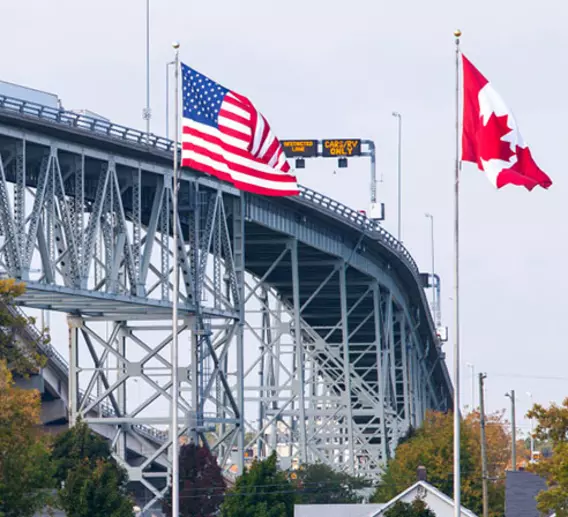Ship to Canada with increased security, speed and savings
The United Nations Comtrade Database on international trade reports more than $363 billion in U.S. exports to Canada in 2021, a record high from the last ten years. With an ever-increasing number of shipments crossing the border, it’s more important than ever to ensure that you can move goods into Canada quickly. Inspections and penalties can be costly, and delayed shipments can impact customer satisfaction. Choosing a carrier with cross-border certification is the easiest way to avoid complications.
Risks of hiring an uncertified carrier
If a carrier doesn’t understand or comply with the clearance process, it can cause several issues for your freight.
- Delays – A carrier without clearance benefits will likely have to wait in long lines and will be subject to more thorough inspections. Improper documentation also can cause shipments to sit while corrections are made.
- Fees – Delays can result in increased shipping costs due to driver detention and ancillary fees for extra services provided during inspections.
- Security risks – Certified carriers must follow specific security procedures throughout the shipment’s journey. If a non-certified carrier handles a high-risk shipment, it could make your freight vulnerable to contamination, theft or other problems.
To get timely, safe and efficient transport, partner with a carrier who has done the work to become certified in one or more of the initiatives below.
Canada-U.S. border certification programs
Checking shipments at border crossings is a matter of national security. Countries want to be sure that the items coming in won’t harm their citizens or ecosystems. To help them discern which shipments are low risk, Canada and the U.S. allow companies to opt-in to programs where they get special clearance. Hiring carriers and drivers with one or more of these certifications will help your shipments cross the border without issue.
Customs Trade Partnership Against Terrorism (CTPAT)
CTPAT is a voluntary public-private sector partnership program between U.S. Customs and Border Patrol (CBP) and trade aimed at strengthening the international supply chain and improving United States border security. The CTPAT program allows CBP to provide the highest level of cargo security through close cooperation with the principal stakeholders of the international supply chain such as importers, carriers, consolidators, licensed customs brokers, and manufacturers. Most carriers that ship between the U.S. and Canada will have both CTPAT and PIP certifications.
Partners in Protection (PIP)
The PIP program allows companies to work with the Canada Border Services Agency (CBSA) to enhance security at the border and throughout the supply chain by preventing smuggling, terrorism and other crimes at the border. During the certification process, the CBSA assesses a company’s security and suggests improvements. Approved carriers are recognized as Trusted Traders and can move low-risk commodities, like retail products or electronics, more efficiently with lower border examination rates.
Automated Commercial Environment Program (ACE)
Carriers can apply for ACE, which is a secure, web-based data portal designed to connect CBP, trade partners, and Partner Government Agencies. The ACE Portal gives companies the ability to submit Importer Security Filings, import truck manifests, protests and electronic export information.
Advance Commercial Information Program (ACI)
Carriers can apply for ACI, which permits them to submit manifests electronically before arrival, allowing for faster clearance and reduced wait times.
Customs Self-Assessment Program (CSA)
The CSA program makes international shipping smoother by allowing low-risk, pre-approved importers, carriers and registered drivers to have simplified border requirements into Canada. Participation allows businesses to save time and money and helps the CBSA more easily identify high-risk shipments.
Free and Secure Trade Program (FAST)
The ultimate border crossing certification is the FAST program. It’s a joint voluntary commercial program between the CBP and CBSA (and Mexico) that aims to tighten border security while still allowing trusted and approved freight to easily travel between the countries. To become authorized in Canada, carriers must be both CSA and PIP approved. Once FAST approved, carriers and registered drivers will have expedited entry when hauling low-risk freight. Shipments transported by FAST-approved drivers will receive:
- Dedicated lanes at the border – These lanes are available at northern entry points in Michigan, New York and Washington.
- Fewer inspections – When a FAST-approved driver presents the required documents, border officers scan them and allow the driver to proceed quickly.
- Simplified clearance procedures – Trade-related verifications are done later, which means your freight can get back on the road fast.
- Enhanced supply chain security – Participation requires that every part of a company’s supply chain is certified under security programs.
- Reduced costs – Streamlined processes, shorter wait times, and on-time delivery can save money in the long run.
- Priority processing following a disaster – After natural disasters or terrorist attacks when security is heightened and shipments are often delayed, certified carriers get priority screening, allowing them to resume business faster.
ArcBest is a certified cross-border logistics provider
By operating with these cross-border certifications, ArcBest® can transport your shipments to Canada securely and on time. Partner with ArcBest and let our Canadian specialists help you with the process from end to end. For questions, please contact tradecompliance@arcb.com.

